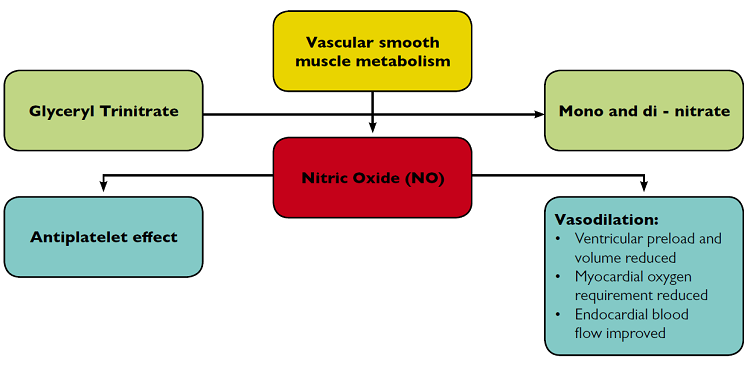Acute attacks of stable angina should be managed with sublingual glyceryl trinitrate, either in tablet or spray format.
Glyceryl trinitrate may also be prescribed for the prevention of predictable angina symptoms during exercise or exertion, in this circumstance patients should be advised to take the tablets or spray immediately prior to exercise or exertion.
Patients prescribed sublingual glyceryl trinitrate should be advised:
- If they experience chest pain they should stop what they are doing and rest.
- Take a dose of GTN as soon as symptoms of angina begin to develop.
- Take a second dose after 5 minutes if the pain persists.
- Dial 999 if the pain has not gone within 5 minutes of taking the second dose or earlier if the pain gets worse or the patient is visibly unwell.2
In addition patients should be warned of the possibility of side effects after taking nitrates including flushing, headache and light headedness. Patients who experience light headedness should be advised to sit down or find something to hold onto until the sensation passes.
GTN is available for symptom relief in two formats tablet and spray, both of which are administered sublingually. Both formats have their individual advantages and disadvantages.
The key benefit of the spray format is the longer shelf life, usually between two and three years, which may make it a more suitable option for patients with infrequent episodes of angina.
The tablets have the advantage that they can be removed from the mouth when partially dissolved if symptoms are relieved or side effects become intolerable.
The main disadvantage of the tablets is that exposure to air results in reduced potency. Patients should always be advised that the tablets should be disposed of and replaced 8 weeks after opening. GTN tablets should always be supplied in glass bottles with a foil lined cap with no cotton wool wadding.
Glyceryl trinitrate is a prodrug that is metabolised to the mono and dinitrate form which are the principle urinary metabolites. A product of the metabolism is nitric oxide which has a potent vasodilator effect. This vasodilator action results in more significant venous dilation than arteriolar dilation. The therapeutic benefit of GTN is:
- Venous dilation causes venous pooling thereby reducing venous return, ventricular diastolic volume and pressure. This is termed a reduction in preload and reduces myocardial oxygen demand.
- Arterial dilation reduces peripheral resistance and afterload. This reduces the amount of ventricular force required during contraction and reduces myocardial oxygen demand.
- Coronary vasodilation. This will improve blood flow and consequently oxygen supply to ischaemic areas.
Diagrammatic representation of the mechanism of action of glyceryl trinitrate:

